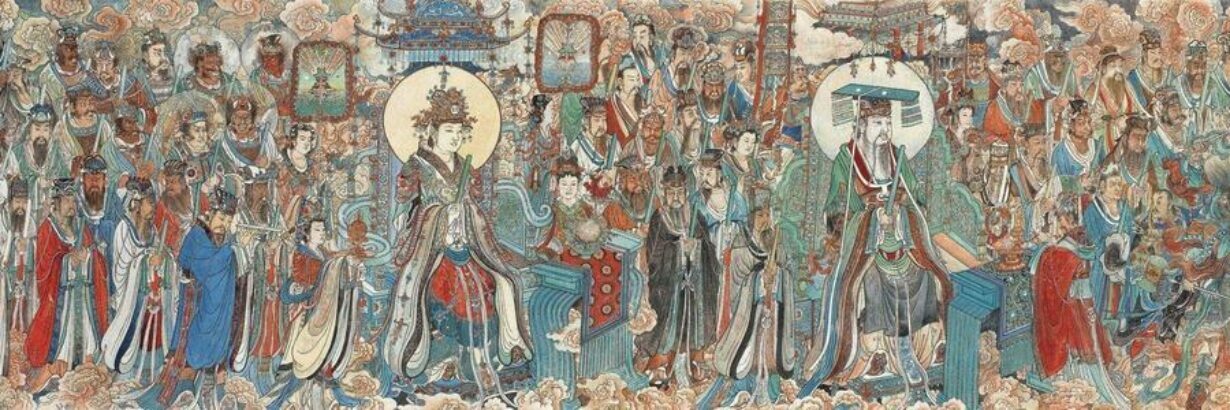On April 27, 2023, Taoist Master Ren Zongquan, Vice President of the Hubei Taoist Association and Vice President of the Wuhan Taoist Association, along with two other Taoist masters, Chen Lifu and Yang Chenglan, Vice Presidents of the Gansu and Wuhan Taoist Associations, respectively, were invited to Malaysia and Singapore for a five-day cultural exchange program by Wang Liyi, the abbot of the Yuxu Palace in Selangor, Malaysia, and Jiang Haifu, the chairman of the San Bao Wang Temple in Singapore.

A view of Yu Hsiu Gong from afar in Selangor, Malaysia
Taoism has a history of more than 100 years in Malaysia, and in recent years, with the increasing number of Chinese communities, Taoist temples, and believers, various Taoist organizations have been established in Malaysia. In 1995, the Malaysian Taoist Doctrine Association was approved by the government to promote Taoist teachings and values, and in 1997, the Malaysian Taoist Organizations Joint Conference was established to carry out extensive publicity activities, hold Taoist seminars, and promote Taoist culture, thus having a positive impact on the spread of Taoism in Southeast Asia.
On the morning of April 28, the delegation visited the Yuxu Palace in Selangor, Malaysia. The palace is a group of Chinese-style antique buildings with green tiles and red walls nestled in peaceful mountains covered with green vegetation, which were especially familiar and comforting in this foreign land.
At 10:00 a.m., led by Abbot Wang Liyi and Taoist Master Liu Liqing, the delegation visited the Jiang Taigong Hall and the Lingguan Hall, which are currently under construction, with materials such as stone carvings and glazed tiles imported from China’s Fujian province.


At 10:30 a.m., a Taoist cultural exchange forum was held in the guest hall of the Yuxu Palace, attended by Taoist practitioners and believers from various parts of Malaysia, including Kuala Lumpur and Seremban.
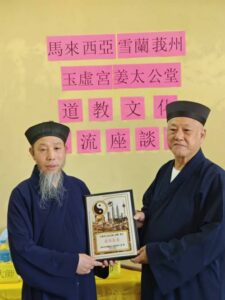
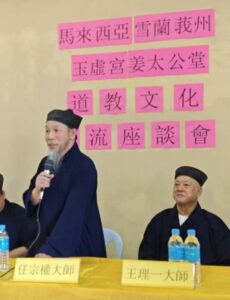
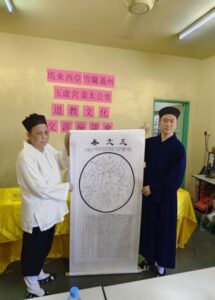
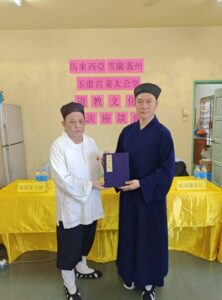
Before the symposium, both sides exchanged gifts.
Firstly, Venerable Wang Li, the abbot of Malaysia’s Jade Void Palace, delivered a speech and warmly welcomed the arrival of Master Ren Zongquan and his delegation. He recalled the past events between Master Ren Zongquan and Jade Void Palace as well as other Taoist masters and expressed gratitude for Master Ren’s 20-year concern and support for Jade Void Palace. He also introduced the current status of Taoism development in Malaysia and emphasized the importance of cultural exchange between Malaysia and China at the appropriate time as the global epidemic situation is easing.
In his speech, Master Ren Zongquan talked about the solemn Quanzhen Taoist precept ceremony held at Sanqing Temple in Miri, Sarawak, Malaysia in early summer 2005, which was jointly organized by the Taoist Federation of Malaysia and the Taoist Association of China. He and Master Ye Zhiming had come to and fro between China and Malaysia several times to discuss and prepare for it, establishing a deep bond with Malaysian Taoism. In particular, he highly praised Master Ye’s important role and enormous contribution in the history of cultural exchange between Chinese and Malaysian Taoism, and proposed that all participants stand up for a minute of silence to mourn and remember Master Ye Zhiming. In 2009, two Malaysian Taoist Gao Gongs (high-priest), Liu Liqing and Li Lihua, returned from Wuhan Wudang Mountain Daoist Temple after completing their studies and overcoming various difficulties. They made outstanding contributions to the cultural exchange between the two countries by striving to inherit the Quanzhen ritual culture. Master Ren Zongquan hoped that under the leadership of Venerable Wang Li, Jade Void Palace would complete its construction as a Taoist cultural center in Malaysia, strengthen talent training, enhance exchanges between Taoism in Kuala Lumpur and Selangor, Malaysia, and Taoism in Wuhan, China, and promote mutual learning and progress of Chinese and Malaysian Taoist cultures. He also proposed that Jade Void Palace and Wuhan Wudang Mountain Daoist Temple become “friendly palaces and temples.” Master Ren Zongquan hoped that all high-level Taoist masters worldwide would further consider how to adapt Taoism to the great changes in the world in the past century, develop Taoism while benefiting the world, and provide practical solutions to promote the harmonious development of humanity and play a unique role in building a community with a shared future for mankind.
In his speech, Abbot Chen Lifu of Lanzhou Baiyun Temple highly praised the important role played by Jade Void Palace in inheriting and developing Taoist culture and sincerely invited Master Wang Li to China to conduct cultural exchanges.
During the exchange, Master Liu Liqing of Jade Void Palace, who is proficient in Taoist music, mentioned that in 2009, he and Master Liu Lihua had the honor to participate in the “Wuhan Daoist Gao Gong Music Learning Class.” After returning home, they imparted what they had learned without reservation to the Taoist disciples of Jade Void Palace through the form of a study class and established the first Quanzhen Taoist music ensemble in Malaysia. It had a high impact in the Malaysian Taoist community and received unanimous praise from the Malaysian Taoist community. He also hoped to continue learning more about Taoist culture in Wuhan, so that Taoist culture and excellent Chinese traditional culture could take root in various countries in Southeast Asia.

Group photo of the Malaysia-China Taoist cultural exchange symposium
As the discussion progressed and questions were raised by the attendees, the atmosphere became more relaxed and lively, eliciting enthusiastic responses from Masters Ren Zongquan and Chen Lifu, who responded to the questions with wit and humor, earning them rounds of applause.

Master’s Live Q&A
At the end of the symposium, Daoist Liu Liqing led the Yu Xu Palace Daoist Master Group in chanting the Quanzhen music “White Crane Flying Immortal Family Music” (白鹤飞Bai He Fei) and “Great Sighing Literature,” (大叹文Da Tan Wen) allowing Daoist Ren Zongquan to assess and comment and looking forward to more opportunities for such exchanges in the future.
At 3:00 pm, led by Master Wang Liyi and Liu Liqing, the nine-member delegation visited the traditional tin handicraft base of Jia Dong Garden in Malaysia, the Tze Cheng Street and the Guan Di Temple and Xian Si Shi Ye Temple in Chinatown, as well as the iconic buildings in Malaysia, such as the Twin Towers and the Central Art Gallery, experiencing Malaysia’s unique architectural culture and folk religious beliefs.
On the 29th, the delegation visited the Malacca Strait and visited the Zheng He Temple in Baoshanting, reflecting on the glorious achievements of China’s outstanding cultural dissemination overseas 600 years ago. That night, they passed the customs and arrived in Singapore, staying at a hotel near the Chong Pang City God Temple.

Group photo with Chen Tianlai, President of the Singapore Taoist Federation, and Huang Xincheng, Director of the Lorong Koo Chye Sheng Hong Temple Orchestra
On the morning of the 30th, led by Huang Xincheng, director of the Lorong Koo Chye Sheng Hong Temple Orchestra, the group went to the Lorong Koo Chye Sheng Hong Temple to worship and received a warm reception from Chen Tianlai, President of the Singapore Taoist Federation. Accompanied by Chen and Huang, they participated in the opening ceremony of the Sanbawang Wealth God Temple and were cordially received by Mr. Lim Wee Kiak, a member of parliament, and exchanged gifts with each other.
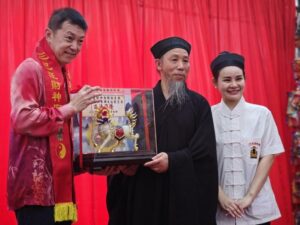
Group photo with Singapore Member of Parliament Lim Wee Kiak exchanging gifts
The Sanbawang Wealth God Temple is located at 28 Navy Street in Singapore and was officially completed in 2006. It is a famous temple in Singapore that worships the Wealth God and is deeply revered by the local people. The temple suffered a sudden fire on September 18, 2020, and the hall was severely burned, but Chairman Jiang Haifu of the Wealth God Temple led everyone to repair it together. The hall was restored to its solemn state, the statues shone brightly, and especially the giant pure copper statue of the Wealth God on the roof, which is 9.44 meters high and weighs 8290 kilograms, is a landmark building in the area.

Group photo of the cultural exchange between Chinese and Singaporean Taoism
After the event, Chen Tianlai, President of the Singapore Taoist Federation, led the delegation to visit the Sanqing Palace, the Bang Ah Earth God Temple, and the Doumu Palace Taoist Temple in turn. President Chen gave a detailed introduction to the construction and future development of various temples and Taoist temples, and in Singapore’s multicultural and multi-religious culture, Taoism occupies an important and unique position.

Group photo with the Lorong Koo Chye Sheng Hong Temple Daoist
In the afternoon, the delegation visited the Lorong Koo Chye Sheng Hong Temple and exchanged gifts. The new comprehensive office building of the Cheng Huang Temple has set up a Taoist cultural performance hall, the Singapore Taoist Academy, a library, conference rooms, and other facilities, with complete functions, advanced equipment, and orderly management. The guests and hosts had profound exchanges on Taoist architecture, music, and culture, and looked forward to further strengthening the interactive exchanges between Chinese Taoism and Singaporean Taoist culture in the future.
As early as 1796, Taoist temples such as Thian Hock Keng were built in Singapore. With the increasing number of Chinese immigrants, Taoism gradually became the main religion for Singaporean Chinese and their most widely practiced faith. In order to better utilize the political and social status of Taoism, the Taoist community in Singapore established Taoist organizations to promote Taoism and gather strength. After 1990, based on the “Sanqing Taoist Association,” the “Singapore Taoist Federation” and the “Singapore Taoist Association” were established. The establishment of these Taoist organizations made Taoism a part of contemporary Singaporean social life. As a social force, Taoism has also been officially recognized by the country and has gained a legitimate place in political, economic, cultural, and community activities in the nation and society.
Especially after 2002, Chen Tian Lai, the general affairs officer of the Lorong Koo Chye Sheng Hong Temple, was elected as the President of the Taoist Federation (Singapore). Since assuming the presidency, President Chen has visited Taoist temples in mainland China, Hong Kong, Macau, and Taiwan, added new halls to the Lorong Koo Chye Sheng Hong Temple, initiated new Taoist activities required by the times, recruited new members, and gradually increased the social visibility of the temple. Under his leadership, the Taoist Federation (Singapore) has achieved remarkable success.

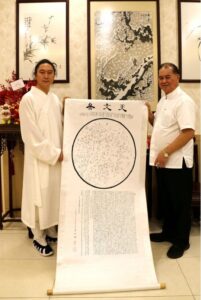
Wuhan Taoist Association exchanged gifts with Lorong Koo Chye Sheng Hong Temple
Huang Xin Cheng, the chief mentor of the temple’s Taoist master group, was a senior master of the Beijing Baiyun Temple’s Orchestra in 1987, graduated from the China Taoist College in 1992, and has made significant contributions to the propagation of Taoist culture in Singapore as the chanting and musical teacher of the Lorong Koo Chye Sheng Hong Temple’s group and the first person to spread Quanzhen Altar Ritual, music, and Gao Gong secret Taoist techniques abroad. Currently, he also serves as the mentor of the Youth Group of the Singapore Taoist Federation, the editorial committee member of the quarterly magazine “Lion City Taoism,” and the assistant conductor of the Singapore Taoist Orchestra. He is also a visiting professor at the Singapore Taoist College, teaching “Altar Ritual Ceremony.” Huang has led the group to participate in mainland China’s Taoist music performance and other activities many times and has recorded and published eight Taoist music CD albums and a “Bai Shen Pian” DVD album, making significant contributions to the healthy inheritance of Taoist culture in Singapore.
During this cultural exchange, Anyou Quan, the president of the Wuhan Taoist Association, and his delegation visited various Taoist temples and organizations in Singapore. They were invited to visit the Quanzhen Education Association, exchange gifts with its president Zhuang Wei Yi, and the master of the Xiandang temple, and took a photo together. On May 1st, International Labor Day, accompanied by Master Huang Xin Cheng, the delegation also visited the Singapore Presidential Palace.
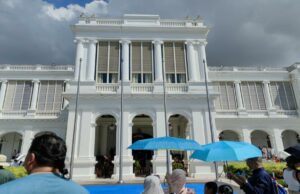
Visiting the Presidential Palace in Singapore
There are both pleasures and hardships in life, only those who taste them can understand. The Tao Te Ching, Chapter 62 says: “Fine words can be bought, good actions can be made.” The recent trip to Malaysia and Singapore by Wuhan Taoism has not only enhanced mutual understanding between international Taoist communities, but also strengthened our bond and further unified our thinking. By vigorously promoting Chinese traditional culture, advancing international cooperation in Taoism, and promoting the building of a community with a shared future for mankind, Taoist culture has played a unique role.
The more magnificent the journey, the greater the goal. Through this cultural exchange, we deeply feel the rapid changes taking place in Chinese society, and its increasing international importance. Promoting overseas cultural exchanges in Taoism, telling good stories of China and Taoism, and demonstrating the great function of cultural confidence of a major country are timely efforts to promote the dissemination of excellent traditional Chinese culture and contribute to the great rejuvenation of the Chinese nation. In this unprecedented era, the cultural integration concept of “knowing the constant, accommodating accordingly, and thus becoming impartial” pursued by Taoist culture is particularly important. We need to learn from the successful experiences of Western research on Taoist culture to constantly enrich ourselves. To adapt to the needs of modern society, it is important to interpret the main classics and doctrines of Taoism in accordance with the spirit of modernization, in order to make Taoist culture understood and accepted by more people, which is also an important direction for our future development.
Author: Yang Chenglan, Wuhan Da Dao Guan
Editing & Translation: Fan Xin Rui , German Daoist Association
